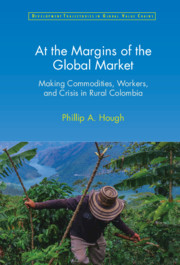Book contents
- At the Margins of the Global Market
- Development Trajectories in Global Value Chains
- At the Margins of the Global Market
- Copyright page
- Contents
- Figures and Tables
- Acknowledgments
- Introduction
- 1 Toward a Sociology of Labor and Development at the Margins of the Market
- Case Study #1 The Rise and Fall of Hegemony in the Coffee Regime of Viejo Caldas
- 2 The Rise of Fedecafé Hegemony in Viejo Caldas
- 3 Fedecafé’s Labor Regime in the Arc of US World Hegemony
- Case Study #2 Despotism and Crisis in the Banana Regime of Urabá
- Case Study #3 The Rise and Fall of FARC Counter-Hegemony in the Coca Regime of Caquetá
- Conclusion
- Appendix
- References
- Index
2 - The Rise of Fedecafé Hegemony in Viejo Caldas
from Case Study #1 - The Rise and Fall of Hegemony in the Coffee Regime of Viejo Caldas
Published online by Cambridge University Press: 07 January 2022
- At the Margins of the Global Market
- Development Trajectories in Global Value Chains
- At the Margins of the Global Market
- Copyright page
- Contents
- Figures and Tables
- Acknowledgments
- Introduction
- 1 Toward a Sociology of Labor and Development at the Margins of the Market
- Case Study #1 The Rise and Fall of Hegemony in the Coffee Regime of Viejo Caldas
- 2 The Rise of Fedecafé Hegemony in Viejo Caldas
- 3 Fedecafé’s Labor Regime in the Arc of US World Hegemony
- Case Study #2 Despotism and Crisis in the Banana Regime of Urabá
- Case Study #3 The Rise and Fall of FARC Counter-Hegemony in the Coca Regime of Caquetá
- Conclusion
- Appendix
- References
- Index
Summary
This chapter traces the origins of Fedecafé’s hegemonic labor regime in Viejo Caldas. It begins by showing how Colombian coffee producers adapted to a peripheral niche of the world coffee market during the era of British hegemony, with semi-marketized small farmers better able to cope with the volatility of prices in the coffee market than large-scale planters that used various proletarianized labor systems. It then shows how Fedecafé emerged as a parastatal development organization charged with consolidating a profitable export sector based upon smallholding farmers. In doing so, it shows how Fedecafé instituted a regulatory social compact (Pacto Cafetero) that protected farmers from the volatility of the market and thus facilitated their conversion into fully proletarianized (market-dependent) farmers. It ends with a discussion of whether the Pacto Cafetero was effective in generating a hegemonic labor regime in Viejo Caldas into the postwar decades.
Keywords
- Type
- Chapter
- Information
- At the Margins of the Global MarketMaking Commodities, Workers, and Crisis in Rural Colombia, pp. 53 - 87Publisher: Cambridge University PressPrint publication year: 2022

